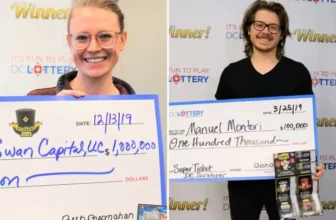
Imagine winning the lottery not once, not twice, but 14 times. Yeah, while the rest of us are scratching our heads (and tickets), Stefan Mandel cracked the system and kept cashing in. If you thought your odds of winning were slim—about 1 in 292 million for Powerball—you were right. You’re statistically more likely to become a movie star or be struck by lightning. Yet, while the rest of us are dodging lightning bolts and avoiding the red carpet, Mandel casually strolled off with millions.
Let’s unravel how this unassuming Romanian turned the tables on the lottery gods.
Who Is Stefan Mandel?

Stefan Mandel wasn’t born into wealth or lottery winnings. Growing up in communist Romania in the 1960s, life wasn’t exactly what you’d call glamorous. He was an economist (fancy title), but that didn’t translate to a fat paycheck—far from it. Struggling to make ends meet, Mandel had two options: engage in illegal activities or flee the country. But no, he had a third, much smarter option—hacking the lottery.
No, he didn’t hack it in the 21st-century sense. Instead, he did it the old-fashioned way, by crunching numbers. His self-developed algorithm predicted 5 out of 6 winning numbers with a shocking level of accuracy. And after four years of fine-tuning, it worked. Mandel and his pals tested it, aiming to snag a modest second-place win in Romania’s lottery. Except…they won the jackpot. Oops.
That jackpot? A cool 72,783 Romanian leu (about $19,000 back then). Small fry by today’s standards, but to Mandel, it was the ticket (pun intended) to freedom. He bribed his way out of the country and fled to Israel with his family.
Australia: The Birthplace of the Lottery Business
Once safely in Australia, Mandel didn’t just kick back. He saw potential. The land down under gave him something Romania couldn’t: access to a booming economy and fewer oppressive restrictions. It was here in the 1980s that Mandel perfected his plan, using computers (because let’s face it, writing millions of number combinations by hand isn’t fun).

Mandel’s process was simple, in theory:
- Calculate all possible combinations for a lottery.
- Find lotteries where the jackpot was at least three times the cost of buying every combination.
- Raise enough funds from investors to buy all possible tickets.
- Print all combinations and claim the prize.
This wasn’t just a few tickets. It was all the tickets. Mandel raised funds from investors, got his hands on printing technology, and printed millions of tickets. The result? Between the 1980s and early 90s, he hit 12 jackpots in Australia, with smaller wins along the way. Not bad, right? His winnings totaled millions of dollars.
Of course, the Australian government wasn’t thrilled. They quickly introduced rules to stop Mandel’s merry winning streak, banning the purchase of all lottery tickets by a single individual or group. Naturally, Mandel outsmarted them again—by creating multiple companies to buy the tickets. But even Mandel couldn’t dodge regulation forever, and Australia eventually tightened the screws enough that he had to call it quits.
But the story doesn’t end there…
Mandel Takes on America – The Virginia Lottery Heist
With Australia clamping down, Mandel set his sights on the big leagues: the United States. Specifically, the Virginia state lottery. Why Virginia? Simple: fewer possible combinations and cheaper tickets. This made it a prime target for Mandel’s final masterstroke.

In 1992, Mandel and his network of investors pooled $7.1 million to buy every possible ticket combination for the Virginia lottery, where the jackpot had ballooned to $27 million. The plan worked, sort of. Mandel didn’t quite buy all 7.1 million tickets—he fell short by about a million. But, with 6 million tickets purchased, it was enough to win the jackpot. Plus, there were some consolation prizes that added another million to the pot.
Naturally, the authorities were less than pleased. Enter the FBI, CIA, IRS—you name it, they were investigating. But here’s the kicker: Mandel didn’t break any laws. His entire operation, despite its eyebrow-raising complexity, was 100% legal. He walked away with $15 million, and the Virginia lottery promptly rewrote the rulebook. For good measure, the U.S. banned anyone from printing tickets at home, because, apparently, that’s a thing now.
The Aftermath: Can You Replicate Mandel’s Formula?
If you’re thinking of replicating Mandel’s system, let’s get one thing straight: it’s impossible today. Lottery systems have since evolved, introducing more combinations (like the infamous Powerball, with its 292 million possibilities) and banning bulk-buying strategies. In other words, they’ve Mandel-proofed the lottery. Sorry, folks, you’re going to have to stick with your one-off ticket dreams.
And as for Mandel himself? After pocketing millions, he retired somewhere off the coast of Vanuatu, enjoying a well-deserved rest. Whether he’s sipping cocktails or plotting his next big scheme, no one knows. What we do know is this: Stefan Mandel outsmarted one of the most random systems on earth—and did it 14 times.
A Legacy Built on Numbers, Not Luck
Stefan Mandel’s story isn’t just about winning the lottery; it’s about using smarts, math, and a little bit of legal loopholing to beat a system designed for you to lose. It’s proof that sometimes, the house doesn’t always win. Well, unless you’re playing today’s lottery, in which case, good luck.
Meet Another Lottery Legend: Richard Lustig
While Stefan Mandel outsmarted the system, Richard Lustig is another name that pops up when it comes to beating the odds. Lustig, a seven-time lottery winner, took a different approach, claiming to have developed a method anyone can follow. Curious about his strategy? Check out our detailed review of Richard Lustig’s lottery-winning method here.
References:
- Chenoweth, Neil. “Stefan Mandel: How a Romanian-born economist ‘gamed’ the lottery.” Financial Review, June 2021.
- National Public Radio (NPR). “The Economist Who Hacked The Lottery: A 14-time Winning Story.” August 2021.
- Virginia State Lottery Commission Archives. “The History of Lottery Regulations: How Stefan Mandel Changed the Game.”







